- Home
- Technical Cooperation Projects
- Index of Countries
- Middle East
- Egypt
- Project for Strengthening Water Management Transfer
- Project News
- A Workshop on Project Cycle Management (PCM) was implemented at Shubra Baloola
Project News
2015-05-07
A Workshop on Project Cycle Management (PCM) was implemented at Shubra Baloola
On April 29 and 30, 2015, the Project for Strengthening Water Management Transfer (SWMT Project) implemented a workshop on Project Cycle Management (PCM) with stakeholders at Shubra Baloola in Middle Delta, which is one of the three pilot sites.
.
In February and March, 2014, the first workshop on PCM was implemented at the three pilot sites and the participants analyzed problems and objectives at each site and developed the draft action plans[1].
Thereafter, based on these action plans, the Project has been implementing project activities such as the Joint Repair Work, Water Measurement and Environmental Campaign in the three pilot sites.
Since the water shortage problem became clear in the first PCM workshop at Shubra Baloola, the Project decided to implement this second PCM workshop so that all the stakeholders can again discuss problems and solutions at the site, based on the results of the activities on water measurement which was implemented in the last summer.[2]
There were total 74 participants in the second PCM workshop including representatives of Branch Canal Water Users' Associations (BCWUAs) in Shubra Baloola, staff of Central Department of Irrigation Advisory Service (CDIAS), General Directorate of Irrigation Advisory Service (GDIAS) and agricultural extension workers, etc.
The participants were divided into five groups to discuss and make problem and objective trees with technical support by facilitators of the CDIAS and the GDIAS. The facilitators were playing an important role in involving all the group members in the discussions and leading them to finalize a realistic action plan, considering all of their opinions.
Since their roles as facilitators are important in implementing the Water Management Transfer (WMT), the Project has tried to enhance such practical capacities during the Staff Training (ST).
In that sense, this PCM workshop gave to the staff of the CDIAS and the GDIAS a chance to practice what they have learned in the ST.
All the groups actively exchanged their opinions on water management in their areas, representatives of the BCWUA also suggested several activities of which they should take responsibility. Especially, concrete actions to solve water shortage in the downstream area were newly proposed, including making a plan to distribute water by rotation and reinforcement of monitoring and dredging activities.
It was finally agreed that all the stakeholders will work together for each of those activities under their own roles and responsibilities.
From now on, the Project will continuously support them in finalizing and implementing their concrete action plan to solve their problems in water management.
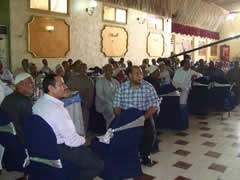 Participants in the workshop.
Participants in the workshop.
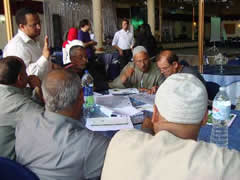 Participants in the group work.
Participants in the group work.
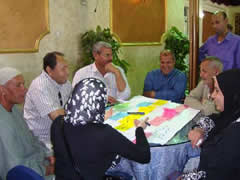 Participants in the group work.
Participants in the group work.
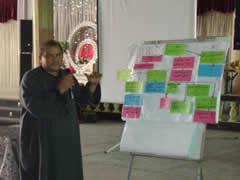 Presentation on results of problem analysis by each group.
Presentation on results of problem analysis by each group.
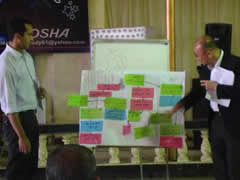 Review and exchange of opinions on results of problem analysis by each group.
Review and exchange of opinions on results of problem analysis by each group.
 Presentation on a draft action plan by each group.
Presentation on a draft action plan by each group.
Notes
- [1] Please refer to the Project News of “Workshops on Project Cycle Management (PCM) were implemented.” (2014-03-05)
- [2] Please refer to the Project News of “Results of water measurement activities were analyzed with a short term expert.” (2014-11-05)
- About JICA
- News & Features
- Countries & Regions
- Our Work
- Thematic Issues
- Types of Assistance
- Partnerships with Other Development Partners
- Climate Change / Environmental and Social Considerations
- Evaluations
- Compliance and Anti-corruption
- Science and Technology Cooperation on Global Issues
- Research
- JICA Development Studies Program / JICA Chair
- Support for the Acceptance of Foreign HRs / Multicultural and Inclusive Community
- Publications
- Investor Relations
